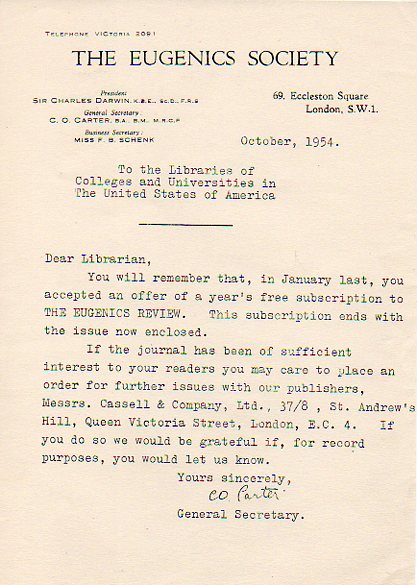ITEM: (Ephemera) 1934 circular from the Eugenics Society to library "subscribers". See below. One page, 8x6 inches. $25
Years ago when I lived in DC a new, upstart newspaper, The Washington Times (a conservative, Sun Yung Moon Unification Church organization-owned entity that is painful to italicize) spent years trying to establish a toehold in the area readership. For years they spent a dollar per daily reader trying to get their message out--the cult leader himself, Rev. Moon, has stated that the paper has cost over a billion dollars to keep "competitive". Since its founding in 1982 the paper has always lost money but has kept its focus on target--recently though there have been breaks in its rigid far-right exterior, changing some of its rhetoric to be more accommodating, like for example in 2009 deciding to use the word "gay" rather than "homosexual". The paper was owned by New World Communications--a branch of the Unification Church--from 1982 to 2010, when the paper was sold directly back to Moon for $1. The paper is still in publication a,most 30 years later. And even though the Unification Church says that the paper is independent from editorial control, former editors of the thing have said otherwise. [New World Communications owns UPI by the way. Happy Happy World World]
For several years running as a matter of fact the Washington Times threw their newspaper onto my lawn, a freebie, news gratis--they just kept coming, day after day, even after I called them requesting that they stop the free delivery. They didn't. I simply didn't want to be included as a statistic as a "reader", because grass-reading was evidently a statistic they could deal with. Had I been a lawyer I think I would've sued them for littering, as that was about the extent of the value of their newspaper, to me. I guess if you give something away long enough, people get used to it, and then, after many years, they are guilt ridden to buy, or--like a phantom song from the radio that you've heard so many times that you know it by heart even though you don't like it--it becomes part of your routine.
That's what I thought of when I saw this circular slide out of one of the volumes in the warehouse of the Journal of the Eugenics Society. It warned librarians that the free ride their library had been given by the society was about to end--maybe--and that if the institution wanted to receive any further issues, they would need to buy them.
Unlike the Washington Times--still in business today--the Eugenics society didn't make it. It died decades ago. Died a death long overdue, died in its seventh decade. Pieces of it lived from ancient times, famously with Plato, developing in more modern times into a societal, philosophical, scrapingly biological branch of pseudoscience, aimed generally at improving the human population through a more-or-less longitudinally dreamed belief system. It was squared away and rounded up with social stats of Karl Pearson and number crunching of Francis Galton (who misunderstood the writing of his cousin, the beautiful Charles Darwin). And in spite of coming into a sort of Renaissance in the early twentieth century, it was mostly put away by Nazi monsters, who broke whatever basis in reality that eugenics had, almost entirely dealing the belief system a mortal blow. Some people still felt comfortable with it enough to use it to continue a practice of population control by sterilizing anti0social elements--including prostitutes and drug addicts, and people of low IQ, but mostly, almost entirely, poor people--up until the 1970's.
It looks like a desperate thing to me, this flyer (available from our blog bookstore, here). It may well have been real, it may have been the case that it wasn't this piece of propaganda that I see it as to help sell a fatal science...but I don't think so. It looks pathetic, paper collar and starched shirt and doctorates and cufflinks and privileges notwithstanding. And it reminds me of the desperate attempts of propaganda machines like The Washington Times to get its message across--even when it is very clear that there are not nearly enough people to fund it, a message machine in desperate search of an audience.




Comments